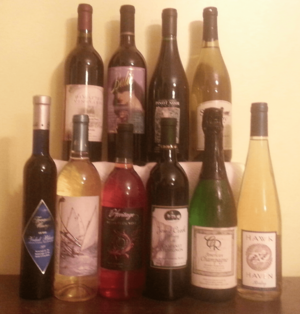List of wineries, breweries, and distilleries in New Jersey facts for kids
New Jersey is home to many places that make special drinks like wine, beer, and spirits! These places are called wineries, breweries, cideries, meaderies, and distilleries. As of early 2024, New Jersey has 51 wineries, 114 breweries, 18 brewpubs (which are like restaurants that make their own beer), 26 distilleries, 3 cideries (for cider), and 1 meadery (for mead). This article will tell you about these interesting places that are currently open in the state.
Contents
History of Drink Making in New Jersey
People have been making drinks like beer, wine, and spirits in New Jersey since the very early days, even before the United States was a country!
The first brewery in New Jersey was started a long, long time ago in what is now Hoboken. This was when New Jersey was part of a Dutch colony called New Netherlands. Sadly, this first brewery didn't last long. It was destroyed in 1643 during a conflict called Governor Kieft's War.
Today, beer making in New Jersey ranges from huge companies like Anheuser-Busch to smaller, local breweries called "microbreweries." These smaller places often make special, unique kinds of beer. Many of New Jersey's breweries are in the busy northeastern part of the state.
New Jersey is also home to the oldest licensed distillery in the entire United States! This is Laird & Company, which started around 1780 in a village called Scobeyville. They received the very first license from the U.S. government to make spirits.
People started planting grapes for wine in New Jersey a long time ago too. In 1767, a group in London even praised two New Jersey wines for being very good! The oldest winery that has been open continuously in New Jersey is Renault Winery, which began in 1864.
Most wineries in New Jersey are smaller, family-owned farms. Because the southern part of New Jersey has sandy soil and a warmer climate, most of the state's wineries are found there. This area is known as the Outer Coastal Plain Viticultural Area. A few wineries are also in western New Jersey. New Jersey wineries make wine from over 90 different kinds of grapes and more than 25 other fruits!
For a long time, laws from the 1920s (a period called Prohibition, when making and selling alcohol was illegal) made it very hard for new wineries, breweries, and distilleries to open. But in the 1980s, New Jersey started changing these laws.
In 1981, a new law helped small, family-owned wineries. It allowed them to open their own stores. Later, New Jersey also created special licenses for microbreweries and brewpubs. In 1995, the Ship Inn in Milford became the first brewpub in New Jersey since Prohibition ended!
More changes came in 2012. New laws made it easier for microbreweries to sell beer directly to customers. In 2013, the state issued the first new distillery license since Prohibition to Jersey Artisan Distilling. A new "craft distillery" license was also created. Finally, in 2017, laws were passed to allow cideries and meaderies to get licenses too. These changes have helped many new and exciting places open up in New Jersey!
Wineries in New Jersey
New Jersey has many wineries where grapes are grown and turned into delicious wine. These wineries are often located in special grape-growing regions called American Viticultural Areas (AVAs).
Some of the well-known wineries include:
- Alba Vineyard in Finesville
- Amalthea Cellars in Atco
- Auburn Road Vineyards in Pilesgrove
- Balic Winery in Mays Landing
- Bellview Winery in Landisville
- Cape May Winery & Vineyard in North Cape May
- Renault Winery in Egg Harbor City, which is one of the oldest.
- Tomasello Winery in Hammonton
These wineries often have tasting rooms where visitors can try different wines and learn about how they are made.
Breweries in New Jersey
New Jersey has a thriving beer scene, with many breweries making all sorts of beers. These range from very large companies to smaller, local craft breweries.
Some of the breweries you might find include:
- Anheuser-Busch in Newark, a very large brewery.
- Artisan's Brewery in Toms River
- Carton Brewing in Atlantic Highlands
- Flying Fish Brewing in Somerdale
- Kane Brewing in Ocean Township
- River Horse Brewery in Ewing Township
- Ship Inn in Milford, which was the first brewpub after Prohibition.
Many breweries offer tours where you can see how beer is brewed and often have taprooms where you can try their different beers.
Distilleries in New Jersey
Distilleries make spirits like whiskey, gin, and vodka. New Jersey has seen a growth in craft distilleries in recent years.
Some of the distilleries in the state are:
- Jersey Artisan Distilling in Fairfield, which was the first new distillery after Prohibition.
- Laird & Company in Scobeyville, the oldest licensed distillery in the U.S.
- Asbury Park Distilling Co in Asbury Park
- Claremont Distillery in Fairfield
- Nauti Spirits in Cape May
These distilleries often have visitor centers where you can learn about the distilling process and sample their products.
See also
- Alcohol laws of New Jersey
- Beer in New Jersey
- Beer in the United States
- Garden State Wine Growers Association
- Judgment of Princeton
- List of breweries in the United States
- List of microbreweries
- New Jersey distilled spirits
- New Jersey Division of Alcoholic Beverage Control
- New Jersey wine
- New Jersey Wine Industry Advisory Council


